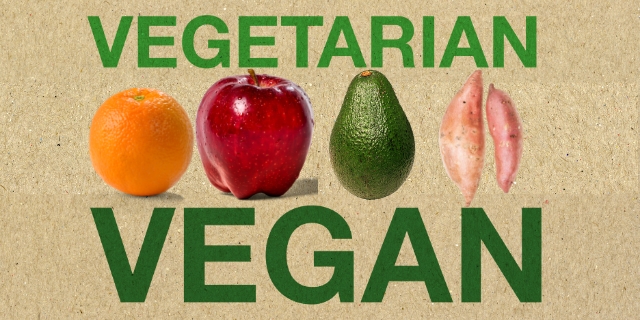04
Mar
Are Your Fruits and Vegetables Vegan? Specific Pesticide Use Makes Produce Non-Vegan?

(Beyond Pesticides, March 4, 2022) An article in My London reported by Finn Byrne, finds labeling on conventionally grown fruits and vegetables marked as non-vegan. The non-vegan label shocked many shoppers who buy the produce with chemical-intensive practices, as fruits and vegetables are inherently vegan. However, pesticides used in the production of fruits and vegetables render these foods non-vegan because of the harm that pesticides cause to animals and since a wax coating on fruits and vegetables made of shellac, a resin secreted from female lac beetles and thus non-vegan.
Recent studies indicate plant-based diets can mitigate excessive pesticide use and exposure if they are organically grown. However, a plant-based diet reliant on pesticides does little to lessen the health and ecological effects of conventional agriculture. Fungicides are ubiquitous in agricultural and residential settings puts human and animal health at risk. Exposure to fungicides can manifest adverse health effects, including reproductive dysfunction, birth/developmental effects, kidney/liver damage, and cancer. Several researchers find that fungicide use promotes more drug-resistant fungal infections in humans as these fungicides are structurally similar to medical antifungal medications.
After investigating fruits and vegetables at various United Kingdom (UK) grocery stores (i.e., Tesco, Morrisons, and Marks and Spencer), the report finds fungicides imazalil and propiconazole present on fruits like oranges. The European Union (EU) bans both chemicals with some exceptions. Furthermore, an alternate version of imazalil (E904) is a wax coating on fruits and vegetables made of shellac, a resin secreted from female lac beetles and thus non-vegan. Since it is no longer a part of the EU, the UK does not have to adhere to these chemical bans. However, the article notes that the toxic health and ecological impacts of these chemicals are the reason why the EU bans imazalil and propiconazole. With that in mind, the use of these chemicals, even in small amounts, can be detrimental.
Fungicide use is becoming a bigger issues with the climate crisis and changes to moisture and temperature conditions that promote the spread of fungi, according to studies. Climate warming may cause fungi to become significantly more heat-tolerant, increasing pesticide use to combat the spread. However, heat tolerance also increases fungi’s ability to infect a host with higher body temperatures as the difference between environmental and body temperature will decrease. Additionally, extreme weather conditions associated with climate change, like flooding from hurricanes, or drought, can promote fungus growth (e.g., mold), resulting in more extensive fungicide use. In addition to containing potentially dangerous compounds, fungicide use in agriculture is often in conjunction with other chemical pesticides to increase potency. The synergy between fungicides and other pesticides can further worsen the adverse effect on human and animal health. Since humans and animals encounter these pesticides through various mediums (e.g., residues on food and in water and air), it is essential to understand how these chemicals work to cause toxicity in humans and animals.
This report adds to the growing body of work evaluating the impacts that pesticides have on dietary lifestyle (e.g., vegan, pescatarian, vegetarian, meat-eater, etc.), indicating a change in dietary habit alone does not prevent exposure to pesticides. Both fungicides in the article have adverse health effects, including kidney/liver damage. Imazalil negatively affects the reproductive system, is a sensitizer/irritant, and can cause developmental delays. The U.S. Environmental Protection Agency (EPA) classifies imazalil as “likely to be carcinogenic to humans,” one of the highest cancer designations, and propiconazole as “possibly carcinogenic to humans.” Furthermore, these chemicals have ecological effects that are toxic to birds and aquatic organisms/fish. The vegan and organic movements share the same critique of conventional agriculture in the treatment of animals, over-feeding and production of crops, and chemical use.
Although the vegan movement excludes animal and their byproducts for consumption or use, intensive chemical use limits the ecosystem services (e.g., wild bee pollination) veganism relies upon. Regardless of dietary lifestyle, the article recommends buying organic when possible. The commentators conclude, “When fruit isn’t suitable for vegans you know something bad is happening. Imazalil & propiconazole are fungicides & are the reason why we should’ve been(long before now) scrubbing citrus fruits before using the peel & washing hands after peeling & before eating treated fruit. Better to buy organic, untreated fruits when available.”
Chemical interventions to “control” pests of any sort, beyond all the potential toxicity issues, fundamentally cause imbalances in ecological systems. When humans use toxic synthetic chemicals to protect “systems” that violate ecological laws, such as monocultures, the natural predators that exist in those ecosystems disappear. Chemical inputs in agriculture reduce the biodiversity that keeps these systems functional. Moreover, the concern about human infection by antifungal-resistant fungi is a distinct echo of the mounting public health threat from antibiotic-resistant bacteria.
With the negative impacts on human and environmental health, including the mounting resistance issues, chemical-intensive agriculture should be understood as a sign of the ineffectiveness of conventional, chemical approaches to pest management.Organic agricultural practices can support biodiversity and protect global health and the environment. Organic agriculture seeks to prevent pest problems by creating healthy agroecosystems. Moreover, switching from a chemical-intensive to an organic diet will drastically reduce the levels of pesticide in one’s body, with one week of an organic food diet showing a 70% reduction in bodily glyphosate levels.
Eating organic should not be a choice to make as all food should be grown with high-quality standards that reject toxic pesticides and protect the environment. Learn more about the adverse health and environmental effects chemical-intensive farming poses for various crops and how eating organic produce reduces pesticide exposure. For more information on determining when to eat organic vs. chemically grown food, see Beyond Pesticides article on The Real Story on the Affordability of Organic Food. Join Beyond Pesticides as the organization continues to push for that reality.
All unattributed positions and opinions in this piece are those of Beyond Pesticides.
Source: My London










